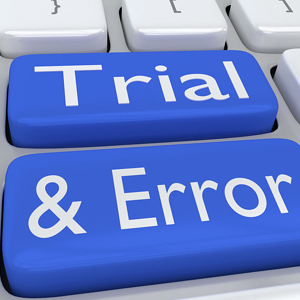Why Do So Many Trials End Up As Tribulations?

I want to give Dave Kurlan of Objective Management Group the credit for stimulating this article. I’ve added a link to his original piece below.
Whilst trials have become an accepted and effective way of selling consumer or personal productivity software tools, many vendors suffer a far lower conversion rate in Enterprise environments.
Whether you think of them as trials, pilots or proofs of concept, these evaluations need to be managed far more carefully for complex software solutions if they are not end up as a frustrating and unsuccessful tyre kicking exercise.
As with so many other aspects of complex B2B sales, failing to prepare and plan typically means that you are effectively planning to fail…
One of the problems with evaluating a complex software solution is that there is almost inevitably “too much to see”, with the result that the prospective customer can end up confused, overwhelmed or underwhelmed (neither extreme is good).
Unlike simple software solutions, complex solutions are by their nature complicated and multifaceted. Even if the application is well designed, there’s always the risk that a poorly supervised evaluation can go off-piste in a hurry.
My observations of both good and bad practice in this area indicate that there are a handful of keys to success when it comes to evaluating complex big-ticket software solutions:
- The evaluation needs to be well qualified in advance
- Clear objectives need to be established for the evaluation
- The evaluation needs to be owned by responsible people on both sides
- Progress needs to be regularly monitored
- A formal end-of-evaluation review must be pre-scheduled, and
- A clear next step needs to be pre-agreed assuming the evaluation is successful
This might seem like a lot of work. But if the evaluation is a serious one, it needs to be treated seriously. And if it’s not a serious one, why should the vendor invest resources in it, or risk their reputation in agreeing it?
Let’s examine each of these preconditions.
Qualification
Both the opportunity and the evaluation needs to be well qualified in advance. If the opportunity is not already well qualified, the chances are that agreeing to an evaluation will be premature and will fail to advance the sale. If the evaluation itself is not well qualified and invested in by the prospect, it is unlikely to succeed.
Clear objectives
Any potential evaluation could always explore more capabilities than it should. The key to successful evaluations is to clearly identify what the customer needs to see proven, and to establish clear objectives that serve to conclusively demonstrate the solution’s functionality in those defined areas, including any mandatory integrations.
Ownership
Evaluations need to be unambiguously owned by a clearly defined and committed person from each of the vendor and the prospect sides. These individuals must be personally vested in the success of the evaluation and have the authority and influence to involve and coordinate other colleagues in the process.
Monitoring
You can’t simply set an evaluation running and hope that it will achieve its objectives. Progress needs to be monitored. Checkpoints need to be established, and any deviation from the plan needs to be identified and addressed.
Review
One of the conditions of agreeing to an evaluation should be that a formal end-of-evaluation review must be pre-scheduled, with participation from the key players on both sides.
Clear next step
Finally, before the evaluation is initiated, both parties need to pre-agree a key next step that (1) is conditional only on the objectives having been achieved and (2) represents a significant advance in the prospect’s buying decision process (and wherever possible leads to an order).
In conclusion…
So, there you have it: my six keys to running successful evaluations in complex B2B sales environments. I can guarantee that if you aren’t already putting these into practice, adopting them will significantly increase the success of your trials, pilots and proofs of concept.
If you aren’t already putting them into practice, I can also confidently guarantee that if you implement them you will end up doing fewer evaluations and wasting less time on unsuccessful ones.
If you’re already successful with a less prescriptive approach, then maybe this is a problem that you don’t need to fix. But if you find your salespeople coming to the end of too many evaluations without winning the hoped-for commitments from their customers in return, maybe you need to think again.
I’ll make one more observation: the discipline required to make these principles work creates mutual respect in the relationship between prospect and vendor. And if your evaluations are not conducted in the spirit of mutual respect, you might ask yourself where else that mutual respect might be lacking across other elements of your sales process.
As promised, here’s the link to Dave’s original article.
Business & Finance Articles on Business 2 Community
(14)

